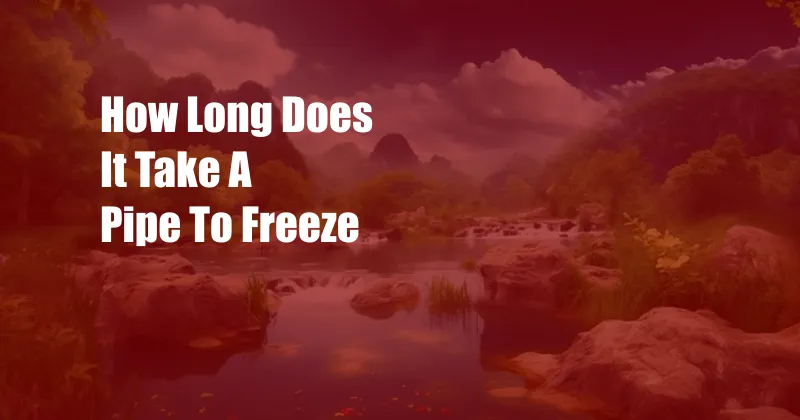
How Long Does it Take a Pipe to Freeze?
Winter’s chilly grip can send shivers down your spine and wreak havoc on your plumbing. Frozen pipes are a common nuisance, causing costly repairs and headaches. Understanding the factors that influence freezing time is crucial for protecting your pipes during the frigid months.
Factors Influencing Freezing Time
- Pipe Size: Narrower pipes freeze faster than wider ones due to their smaller water volume and reduced insulation.
- Water Pressure: Higher water pressure slows the freezing process by increasing water flow and preventing ice crystals from forming.
- Insulation: Insulation acts as a protective layer, slowing down heat loss and extending the freezing time.
- Wind Speed: Strong winds accelerate heat loss, increasing the risk of freezing.
- Ambient Temperature: Obviously, freezing occurs more rapidly at lower temperatures.
Types of Pipes and Freezing Time
The type of pipe material also affects freezing time:
Copper pipes: Highly conductive, allowing heat to escape quickly and freezing faster than other materials.
PEX pipes: Flexible and resistant to freezing, but can still freeze if exposed to extreme cold for extended periods.
PVC pipes: Less prone to freezing due to their low thermal conductivity, but can become brittle and crack under extreme cold.
Cast iron pipes: Durable and less susceptible to freezing, but can corrode over time, increasing the risk of leaks.
Prevention Tips and Expert Advice
- Insulate pipes: Apply foam insulation sleeves or wrap pipes with electrical heat tape to minimize heat loss.
- Seal air leaks: Cold air can infiltrate through gaps and cracks, chilling pipes. Seal any air leaks around windows, doors, and vents.
- Keep faucets slightly open: A small trickle of water keeps water flowing and reduces the risk of freezing.
- Cover outdoor faucets: Use insulated covers or foam insulation to protect exposed outdoor faucets.
Frequently Asked Questions (FAQs)
Q: What temperature do pipes freeze at?
A: Pipes generally freeze at or below 32°F (0°C).
Q: How long does it take for a pipe to freeze?
A: Freezing time varies depending on the factors mentioned earlier. In general, a 1-inch copper pipe can freeze within 30 minutes in freezing temperatures without insulation.
Q: What are the signs of a frozen pipe?
A: Slow or no water flow, bulging pipes, and frost or ice formation on pipes.
Conclusion
Protecting your pipes from freezing requires understanding the factors that influence freezing time and taking proactive measures. By insulating pipes, sealing air leaks, keeping faucets open, and covering outdoor faucets, you can minimize the risk of costly repairs and enjoy peace of mind during the winter months. If you encounter a frozen pipe, remember the tips and advice provided in this article for effective thawing techniques.
Are you concerned about frozen pipes this winter? Share your questions or experiences in the comments below.